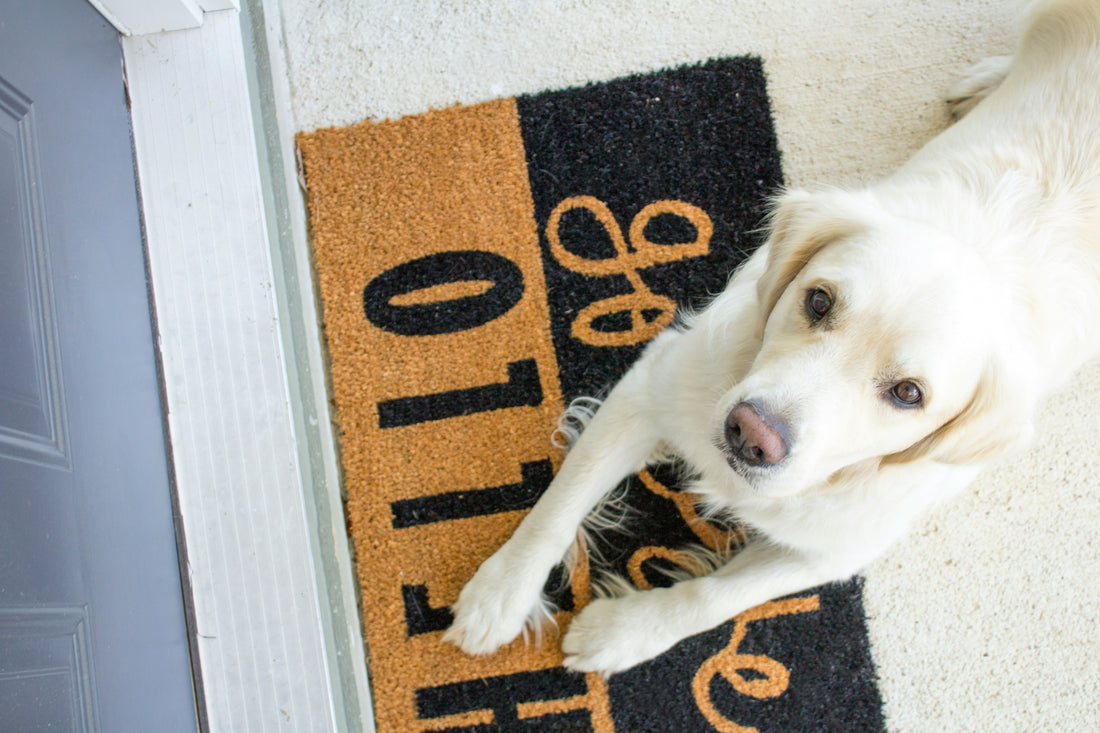How to Stop Dogs from Scratching Doors

The sound of your dog scratching at the door can be as frustrating as nails on a chalkboard, especially when it leads to unsightly marks and costly repairs. This not only damages your home but can also indicate underlying issues with your dog that need to be addressed.
If you’re trying to figure out how to stop your dog from turning your doors into their personal scratch pad, you’re in the right place. In this article, we will look into the reasons behind door scratching and offer practical solutions to help keep your doors scratch-free.
Understanding Why Dogs Scratch Doors
Seeking Attention
Dogs often scratch doors as a way of communicating their desire for attention. If your dog feels isolated or knows that you’re on the other side of the door, they may scratch in an attempt to be close to you.
This behavior is especially common in dogs that are highly social and thrive on interaction with their owners. Understanding this need can help dog owners identify more positive ways to fulfill their dog’s social requirements without encouraging destructive behavior.
Anxiety and Stress
Door scratching can also be a manifestation of a dog’s anxiety or stress. This is particularly true for dogs that experience separation anxiety or those that become anxious in response to external stimuli, such as loud noises (thunder storms or fireworks) or unfamiliar situations.
These anxious feelings can drive a dog to scratch at doors in an attempt to escape or alleviate their discomfort. Recognizing signs of anxiety in your dog is the first step toward providing them with the support they need to feel secure.
Boredom and Excess Energy
A lack of mental and physical stimulation can lead dogs to engage in a variety of destructive behaviors, including door scratching. Dogs with excess energy and no outlet for it may turn to scratching as a way to entertain themselves or burn off some of that pent-up energy. Providing adequate exercise and mental stimulation is crucial in preventing boredom-induced behaviors and ensuring your dog’s overall well-being.
Preventive Measures to Discourage Scratching
Early Training and Habit Prevention
One of the most effective ways to prevent your dog from scratching doors is to nip the behavior in the bud with early training. From the moment a puppy joins your family, it’s crucial to establish boundaries and teach them what is and isn’t acceptable behavior within the home.
Habit prevention can involve redirecting your dog’s attention to chew toys or engaging them in activities whenever they approach a door to scratch. Consistency and patience in these early stages can save you a lot of frustration and door repairs down the line.
Providing Adequate Exercise
Dogs are naturally energetic creatures that require regular physical activity to stay healthy and happy. A dog that receives adequate exercise is less likely to exhibit destructive behaviors, including scratching at the door.
Long walks, runs, and play sessions are essential to channel your dog’s energy. Remember, a tired dog is a good dog, and ensuring your furry friend gets enough physical stimulation is a key component in preventing door scratching.
Also read: Puppy Breathing Fast, Is It Normal?
Effective Strategies to Stop Door Scratching
Ignoring the Behavior
Ignoring your dog’s door-scratching behavior can be a powerful strategy, albeit a challenging one to implement. When dogs scratch at the door to gain attention and are rewarded with any form of interaction, even if it’s to scold them, they learn that scratching is an effective way to get what they want.
By deliberately choosing not to react to their scratching, you teach them that this behavior does not lead to the desired outcome. It’s essential, however, to ensure your dog’s needs are met before adopting this approach, as ignoring genuine distress or needs could lead to further issues.
Calming Supplements
Supplementing your dog with specific ingredients like Bando’s Calming Soft Chews which contain a blend of hemp, valerian root, and chamomile extract can help them with their anxiety issues. Some dogs are more sensitive to stress than others, and supplements can be a great way to support serenity and well-being.
Commands and Obedience Training
Training your dog to respond to commands is another effective way to curb door-scratching behavior. Teaching commands such as “sit,” “stay,” or “leave it” can redirect your dog’s focus away from the door and toward you, providing an opportunity for positive reinforcement.
Consistent obedience training strengthens your dog’s understanding of acceptable behaviors and can significantly reduce incidents of scratching at the door. Remember, the key to success with this strategy is consistency and patience.
Use of Deterrents
Applying safe deterrents or installing physical barriers can also help discourage your dog from scratching doors. Products like double-sided tape, scratch guards, or even a vinyl door protector can make scratching less appealing or even impossible.
Additionally, using deterrents such as bitter apple spray on the lower part of the door can discourage scratching through taste aversion. It’s important to use these methods judiciously and in combination with positive reinforcement to avoid causing distress or confusion to your dog.
By integrating these strategies into your approach, you can effectively reduce or eliminate your dog’s door-scratching behavior. However, it’s crucial to address the underlying causes of this behavior to achieve long-term success.
Addressing Underlying Causes
Separation Anxiety Solutions
Dogs scratching at the door can often be a sign of separation anxiety, a condition where a dog becomes distressed and anxious when separated from their owners. To address this, desensitization exercises can be beneficial. Gradually acclimating your dog to being alone for short periods and slowly increasing the duration can help reduce their anxiety.
Additionally, creating a safe and comforting space for your dog, such as a crate or a specific room with their bed and favorite toys, can provide a sense of security. For severe cases, consulting a professional dog behaviorist or a veterinarian for advice on medication or specialized training techniques might be necessary.
Environmental Enrichment
Enhancing your dog’s environment with toys and puzzles can significantly reduce door-scratching behavior by providing alternative sources of entertainment and mental stimulation. Interactive toys that dispense treats, puzzle feeders, and chew toys can keep your dog occupied and mentally engaged, diverting their attention away from the door.
Regularly rotating these toys can also help maintain your dog’s interest and prevent boredom. Creating a stimulating environment not only deters unwanted behaviors but also contributes to your dog’s overall well-being.
Professional Help for Behavioral Issues
Persistent door-scratching behavior that does not respond to home interventions may require the expertise of a professional. Dog trainers and animal behaviorists can offer personalized training strategies and behavior modification plans tailored to your dog’s specific needs.
These professionals can also provide insights into your dog’s behavior, helping you understand the root causes of their actions and how to address them effectively. Seeking professional help can be a valuable step in resolving complex behavioral issues and restoring peace to your home.
Let’s Recap: How to Maintain a Scratch-Free Home
Maintaining a routine that includes ample exercise and mental stimulation is paramount in preventing your dog from resorting to behaviors like door scratching. Regular physical activity ensures your dog expends energy in a healthy way, reducing the likelihood of them feeling the need to scratch at doors out of boredom or excess energy. Incorporate a variety of activities such as walks, runs, and interactive play sessions to keep your dog physically engaged. Similarly, mental stimulation can be provided through training sessions, puzzle toys, and games that challenge their mind, keeping them mentally satisfied and less likely to engage in destructive behaviors.
Consistency in training and the use of positive reinforcement are key elements in encouraging good behavior and discouraging unwanted actions such as door scratching. Establish and maintain clear rules and boundaries for your dog, and use positive reinforcement to reward compliance. Treats, praise, and affection are effective rewards that can motivate your dog to follow commands and exhibit desirable behaviors. By consistently reinforcing these positive behaviors, you can help ensure that your dog remains well-behaved and that your doors stay scratch-free.
The effectiveness of the strategies implemented to stop your dog from scratching doors should be regularly monitored and adjusted as needed. Each dog is unique, and what works for one may not work for another. Pay close attention to your dog’s response to the various methods you employ, and be prepared to try different approaches if necessary. Flexibility and a willingness to adapt your strategies can significantly increase your chances of successfully curbing your dog’s door-scratching behavior.
By understanding the reasons behind door scratching and implementing a combination of preventive measures, effective strategies, and addressing underlying causes, you can create a harmonious living environment for both you and your dog. Remember, patience, consistency, and a positive approach are your best tools in this endeavor.
Book a Consultation Call with Our Team of Experts
If you’ve tried everything and your dog is still scratching at the door, it might be time to seek professional help. Our team of experts is here to provide personalized advice and support tailored to your specific situation.
Whether you need help with training techniques, or behavior modification, or simply want to discuss the best approach for your dog, we’re here to help. Book a consultation call with us today, and take the first step towards stopping your dog’s door-scratching behavior for good.






